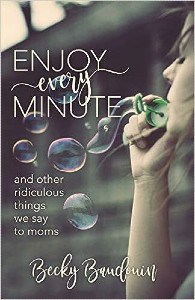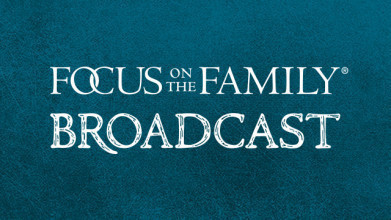Becky Baudouin: Jesus says, “Learn the unforced rhythms of grace. I won’t lay anything heavy or ill-fitting on you.” Keep company with me and you’ll learn to live freely and lightly. And that speaks so much to me because I burden myself all the time with so many of these things that God is not putting on me.
Jim Daly: Yeah.
Becky: I am carrying burdens that he didn’t intend for me to carry. So yes, being a mom is hard, um, but I think that God wants to lift our burdens.
John Fuller: That’s Becky Baudouin and she joins us today on Focus on the Family. Your host is Focus President and author, Jim Daly, and I’m John Fuller.
Jim: You know, John, parenting can be so rewarding. Uh, some people say it’s rewarding in the long run. The best advice that Jean and I receive was just enjoy each season ’cause it- it can be all enjoyable.
John: Mm.
Jim: Now, the terrible twos was, yeah, maybe not that enjoyable, but I get the point. Just be on the ride and enjoy it as you go through it, even with the ups and downs. And there are days that you’re in the trenches and feeling like, are you serious? Is this ever gonna end? Whatever it might be, the teenage years or the diaper years. It doesn’t matter. But we want to be a voice of encouragement to the parents, and we want to, uh, have you listen to a guest that I know is gonna really speak to every mom’s heart. She’s written this wonderful book, Enjoy Every Minute, and, uh, somewhat sarcastically maybe. I don’t know. We’ll find out, but our guest has really put a lot of thought into the mommy burden, and the mommy joy, and I’m looking forward to our discussion.
John: Well, and the subtitle, Jim, I think, uh, does give a little bit more contour to it. Enjoy Every Minute, and Other Ridiculous Things We Say to Moms, right?
Jim: (laughs) There you have it.
John: It’s a- it’s a great book that Becky has written, and uh, we’re looking forward to the conversation, as that book provides the springboard for what we talk about today. Get your copy of, Enjoy Every Minute and Other Ridiculous Things We Say to Moms at focusonthefamily.com/broadcast.
Jim: Becky, welcome to Focus. This is your first time.
Becky: It is. Thank you. I’m so glad to be here.
Jim: And you’re coming from Chicago, that area.
Becky: The Chicago area, yeah.
Jim: So that’s great. We love our friends in Chicago. We have many that listen to Focus on the Family. So you started writing about, uh, things strangers would say to you (laughs) that sometimes, obviously, didn’t sit well with you. Speak to that motivation to write this book based on those idioms that people were throwing your way as a young mom.
Becky: Yeah. Well the big one is the- the title of the book, and I probably heard this like, a hundred times-
Jim: (laughs) Yeah, a hundred times.
Becky: … when my kids were little, you know, like in the grocery store or when I’m out walking with my kids. And it would always be moms who were a little further down the road than me, and they would see my girls and to reminisce. Which I wanna point out the difference between reminiscing and really remembering. I think when you really remember, you’re remembering the whole scope of the good days and the hard days.
Jim: Yeah.
Becky: But they would reminisce and it’s really to indulge in the enjoyable recollection of past events. So they would strike up a conversation and say, “Oh, your girls are so cute,” and then they would say something like, you know, “My- my little Suzie’s now in college.”
Jim: (laughs) Right.
Becky: And I knew they were gonna say, “Enjoy every minute because the time goes so fast.” And it’s very well intentioned and when you’re looking back on it, I really get that now ’cause my girls are older. But as a young mom who is really tired and overwhelmed, I would think, I know I should be enjoying every minute, but some moments are really hard.
Jim: So, it’s kind of interesting. It added a dose of guilt-
Becky: Yeah.
Jim: … in some ways.
Becky: And kind of negative self-talk.
Jim: Right.
Becky: You know, like, what’s wrong with me? I should, this is harder than I thought it would be some days.
Jim: Yeah. I could see how that, I mean, we heard the same thing with our boys.
Becky: Yeah.
Jim: You know, enjoy every minute. I did think that piece of advice was good. It was more like, every phase is a good phase.
Becky: Yeah.
Jim: And it doesn’t always feel like that.
Becky: No.
Jim: ‘Cause especially when they’re young and I mean, all you’re doing is laundry and feeding, and cleaning and wiping, and diapers, and you’re going, really?
Becky: Yeah.
Jim: This is overwhelming, right?
Becky: Right.
Jim: But you then look back on it-
Becky: Yeah.
Jim: … and the charming things that took place, the cooing, you know-
Becky: Yeah.
Jim: I remember Troy used to sleep on my chest almost every night. You know, Jean would feed him-
Becky: Aww.
Jim: … and he’d come over, and he was such a peanut. I mean, he was probably all of what, 20 inches long, and he’d lay on my chest-
Becky: Yeah.
Jim: … and I’d watch the news, and I just loved it.
Becky: Yeah. Those are the moments we would wanna go back to.
Jim: Yeah, those are the moments.
Becky: Yeah. Yes.
Jim: The dirty diapers, not so much. (laughs)
Becky: And like, we had something happen recently. We were in a, um, a very nice restaurant, and there was a family with young children and the little boy had a complete meltdown.
Jim: Yes.
Becky: Like, the dad had to pick him up and carry him to the bathroom. My husband was on his way to the bathroom and turned around and came back, ’cause it was just like, this kid was screaming-
Jim: Yeah.
Becky: … and like, you would never go up to a dad or a mom in that moment and say, “You know what?
Jim: Enjoy every moment (laughs).
Becky: Enjoy this.” This is not gonna last forever. Someday he’s not gonna do this. You know, it’s only in those moments that you really see that bring you back to those-
Jim: Yeah.
Becky: … memories that are so good.
Jim: And that’s the point. You speak about motherhood being like a pilgrimage.
Becky: Yeah.
Jim: What- what do you mean by that, and what’s the benefit of viewing it in that way?
Becky: Yeah, that’s sort of the framework for this book. It comes from Psalm 84. Um, it says, “Blessed are those whose strength is in you, whose hearts are set on pilgrimage.” And I love that phrase because I think, um, a pilgrimage can be described as a long trip, a long journey, with a spiritual significance-
Jim: Yeah.
Becky: … and I think that’s a great definition of motherhood and parenting. So it’s to set our hearts on pilgrimage. It’s to hold the long view to know that this is a lifelong journey. Um, we expect hills and valleys.
Jim: Yeah.
Becky: We expect good seasons and hard seasons. And I think there’s also just this intentionality and purpose when our hearts are set on the journey.
Jim: Yeah. And I’m sure you resonate when I mentioned that, and the book talks about that idea of seasons.
Becky: Mm-hmm.
Jim: Like, you may not enjoy every moment, but the seasons, when you, especially when you look back are gonna be rewarding.
Becky: Mm-hmm.
Jim: But it’s taking the whole thing in account, right?
Becky: Yeah.
Jim: And when you’re in the middle of it, it’s like trying to see the forest through the trees, right?
Becky: Yeah.
Jim: It’s going, I- I cannot believe I’m ever gonna look back on this and think, wow, this was fun.
Becky: Yeah.
Jim: So, speak to the season attitude. How do you develop that attitude to be seasonally minded and in the moment, maybe have some amnesia (laughs) if it’s necessary?
Becky: Well, one of the things I like to think about is holding the long view.
Jim: Yeah.
Becky: You know, because certainly, enjoy the really great seasons, and I think if we had a magic remote control, we would want to pause on some of those moments-
Jim: Edit those out.
Becky: … that are just like you said, or just pause and like, enjoy them, or rewind back-
Jim: (laughs)
Becky: … to when your baby was sleeping on your chest every night.
Jim: Oh yeah.
Becky: But then we wanna fast forward through some really hard seasons. So um, I like to think about zooming the lens back out, like on your phone, when you zoom in-
Jim: Right.
Becky: … to see someone’s face or words more clearly. I think we can get overwhelmed in the moments. But if we zoom out, it, for me, it’s helpful ’cause it reminds me like, I don’t have to fix all the problems today.
Jim: Yeah. Let’s-
Becky: I don’t have to figure everything out right now or have all the answers.
Jim: It’s so encouraging, I think particularly to moms. You’ve kind of written this directly at the mom’s heart, which is good.
Becky: Yes. Yeah.
Jim: You- you experienced a difficult time when your mom was diagnosed with terminal cancer, and that-
Becky: Mm-hmm.
Jim: … that kind of put things into perspective, I’m sure.
Becky: Oh yeah.
Jim: So, what- what was that like going through that? What did it speak to you? Uh, you know, so often, you know, we’re the adult children that are kind of in the warm up, the batter’s warm up circle, right?
Becky: Yeah.
Jim: We’re not at the plate yet, and when something like that happens, then all of a sudden, you are at the plate of life.
Becky: Yeah.
Jim: You’re the one swinging at the pitches now when you lose your parents. What happened for you?
Becky: That was such a difficult season, and I just, the helplessness of just not being able to- to fix or change the situation. Um, and that was a time I real, I told my friends, if I could just fast forward, I didn’t want to see her suffer.
Jim: Yeah.
Becky: I didn’t want to see her die. And I just said, “If I could just skip it all and go to the funeral, I would.”
Jim: Mm.
Becky: And it sounded terrible to admit that, but I didn’t want to go through what was right in front of me. And what I found was that, as I just stayed in those moments, there were some gifts of time with her, um, friends who came alongside and walked with me in God’s presence. You know, we don’t like to go through the valley, but that’s most often when we experience God’s presence and his peace and we come to trust him more. So, and I know moms who are in a valley right now with their kids, with and you know, and parenting, and it’s the same thing. We just wish we could fast forward and skip over the hard stuff.
Jim: You know, it’s so important because I think sometimes as Christians, yeah, we think God will just transport us forward and we don’t need to feel that pain.
Becky: Mm-hmm.
Jim: But there is purpose in that pain.
Becky: Yeah.
Jim: But that’s a hard one to kind of rectify, I think.
Becky: Yeah.
Jim: If God really loved us, maybe he wouldn’t let us feel that pain.
Becky: Right.
Jim: But that’s not what life is about, typically.
Becky: Right. And again, a perspective to come back to. This is a lifelong pilgrimage.
Jim: Yeah.
Becky: You know? And some of us are planting seeds right now, that we may not see fruit for a while. You know, it can be kind of a lonely road. It can be a weary-
Jim: Yeah.
Becky: … journey, you know, as moms, um, and dads too, like just as parents.
Jim: Yeah, it’s so true. There’s another platitude you mention in the book, and I love that, you know. Stop and think about what we’re saying to each other.
Becky: Yeah.
Jim: It’s such a good practice (laughs).
John: It is.
Becky: Yeah.
Jim: Because sometimes we say silly things to one another.
Becky: Yeah.
Jim: But uh, this one is about a mother’s love being pure and selfless.
Becky: Yes.
Jim: Which I think sounds good.
Becky: Yeah. It does, and I think we hear it in different way. I heard it, um, I was in a… at a table with some other women. It was at a women’s Bible study. And one of the women was, I think she was thinking about her mom and her grandma who were not with her anymore. And she said this, and I think if I’d been drinking my coffee, I would’ve choked on it, because when she said, you know, “A mother’s love is the only love that is totally pure and selfless,” and some of the other women agreed. And I just thought like, I would never say that. I know myself too well.
Jim: And- and what caught your attention with that?
Becky: Just maybe the, um, the way we idealize our own mothers and grandmothers-
Jim: Ah.
Becky: … and only remember. We reminisce about only the good. Um, but also, for just, maybe we’re a little bit deceived in thinking that we, as mothers, our love is always going to be totally pure and selfless. ‘Cause it can look like, on the outside a mom is doing everything for her kids-
Jim: Mm.
Becky: … but what you might not know is that, sometimes we might be so uncomfortable with our kids being upset with us that we just do whatever we can to make them happy.
Jim: Yeah.
Becky: Or maybe we don’t like to see them go through hard times, so we wanna step in and rescue or try to fix. Our motives are not always pure and selfless.
Jim: Right. You know, it’s in- interesting ’cause even saying it, it sounds like I’m describing God’s love.
Becky: Yes.
Jim: (laughs) which is-
Becky: And his love is the only love that’s pure and selfless.
Jim: (laughs) Yeah, I think his-
Becky: It is.
Jim: … is the only one that’s pure, so.
Becky: But having said that, I think mom, a mother’s love is definitely special.
Jim: It’s in the unique spot.
Becky: And moms are irreplaceable.
Jim: Yeah.
Becky: But I think we have to be real about our own brokenness and you know, the times that our motives are not pure.
Jim: Yeah. In looking at the book and getting ready to talk with you about this, the one thing that caught my attention was your honesty about your anger.
Becky: Yeah.
Jim: And your daughter, Kate, and some of the interactions-
Becky: Yeah.
Jim: … you would have as a mom, and how you had to, kind of, uh, figure out what was going on.
Becky: Yeah.
Jim: So, describe that anger, where it was coming from and what you were learning-
Becky: Yes.
Jim: … with this, these eruptions that would occur, and-
Becky: I am really honest.
Jim: I’m sure a lot of moms would identify with this.
Becky: Yeah. Yes. So, I remember the first time I got angry with my first born, Kate. And she, I wasn’t angry with her. I got, I lost it in front of her. She was six months old. She had gotten an ear infection and I thought it was my fault, and I know that doesn’t make sense, but moms feel guilty about everything, right?
Jim: Oh yeah. That does make sense.
Becky: So I thought I had done some, I, you know, and I had my pediatrician telling me, “Give her an antibiotic.” My chiropractor was saying, “Don’t give her an antibiotic.” And I just was pressuring myself so much to do the right thing, so I decided to give her the medicine. She was in a bouncy seat and I tipped the spoon up to pour it into her mouth, and she just turned her head and spit it all out, and I just lost it. That was like, the last thread for me.
Jim: She didn’t like the flavor.
Becky: And she didn’t like it, but now I’m like, do I give her another dose? You know, she’s crying. She needs this medicine, but she won’t take it. I felt like a failure. I felt really scared that I wasn’t doing a good job. And I walked into the kitchen. She was right there, and I saw this frying pan on the stove, and there was like, some scrambled eggs in it from the morning. It just made me so mad, and I- I took it, I threw it in the sink, and I slammed a door, and I was kinda yelling, and then I saw her out of the corner of my eye, and she was just looking at me (laughs) like-
Jim: Like, what’s going on?
Becky: … wide-eyed alarmed. And then I started to cry ’cause I felt so guilty, and I thought, I went and picked her up, and I thought, um, she’s so young, she won’t remember this and I’ll never do it again. And of course, I- I wasn’t able to never do it again.
Jim: Right.
Becky: Over and over, as the kids were, you know-
Jim: Pushing buttons.
Becky: … pushing buttons-
Jim: Yeah.
Becky: Saying no, and so, fast forward 16 years, and now, her and I are butting heads quite a bit. And there was one moment where I had, um, left her room, and I was so angry, I slammed her door really hard, and a frame fell off her wall.
Jim: A picture frame.
Becky: A picture frame. And um, you know, she kinda yelled from inside, you know, you, “My frame fell down.” I came in, I apologized. I said, “I’m so sorry. That was wrong. I won’t ever do that again.” And then, a few months later, we had a fight that was even worse. And as soon as I left her room and that door left my fingers, I just was filled with so much regret, and I just waited for the door to slam. I waited to see if the frame would crash to the floor again, and it did, and she yelled, “This time you broke my frame.” And that was a pivotal moment for me because I just, that verse, um, James 1:20 says, “Because human anger does not produce the righteousness that God desires.” That verse came to my mind and I thought, it doesn’t give me what I want either.
Jim: Huh.
Becky: I want a connected, loving, healthy relationship with my daughter, and my anger is getting in the way of that. So I began to really do some personal growth work and look at, um, what was under the anger. It was usually fear.
Jim: Right.
Becky: You know, that was driving my anger, and um, I saw a counselor for it. I opened up with some friends. I asked people to kind of help me unpack what was at the core of that.
Jim: And you got there.
Becky: And I began to be, see fruit then.
Jim: Yeah.
Becky: Grow out of that season.
Jim: Yeah, I think that the guilt attitude, I’ve often said this here in the studio when we’re talking with a mom or a wife. Women have an incredible capacity to own guilt.
Becky: Yeah.
Jim: I think men, we’re so egotistical, generally, we’re like, “It’s the other guy’s fault. It’s never our fault,” and women, it’s just, always their fault.
Becky: Yeah.
Jim: It’s- it’s an interesting way that we’re wired, generally.
Becky: Mm-hmm.
Jim: I’m sure there’s going to be the 80/20 rule and if you don’t fit that, I get it. But generally, uh, moms carry a lot of guilt.
Becky: Yeah.
Jim: You had a friend, Trisha, who I think, she had a super reader day with her child.
Becky: Yeah.
Jim: And it kind of, exemplified that mommy guilt. What happened?
Becky: Yeah. She told me this story, um, and I thought, every mom needs to hear this. So, her son, uh, Jack, was in first grade and she went to pick him up from school one day. And she overhears another mom talking about how excited her daughter had been to go to school that day for super reader day.
Jim: (laughs)
Becky: And Trisha’s heart just kinda sank because she forgot to send him to school with his favorite book, his stuffed animal, and um, I think they were supposed to bring a blanket to sit on.
Jim: (laughs) Right. This is a terrible parenting failure.
Becky: And so, she is just, and I’ve been there. I think most moms listening would say, “Yes,” you have a moment like that. So anyway, when he came out, she just, right away said, “I’m so sorry. I forgot to pack your stuff.” And, but he was okay. He said, “I was really disappointed and kinda confused when I opened my backpack and didn’t see what I needed. And I went to my teacher, and I just said, I don’t know what to do,” and so she had an extra bookshelf where he could pick-
Jim: That’s a good teacher.
Becky: That’s a very good teacher, yes.
Jim: (laughs)
Becky: Um, and she had extra stuffed animals. So he chose a book from her shelf and a stuffed animal. He sat in the gym and he read, and he said it was a great day.
Jim: Yeah.
Becky: And I just thought, moms need to hear this because he didn’t fall apart. It didn’t ruin his day that she had made a mistake. We’re gonna make mistakes.
Jim: Mm-hmm.
Becky: We are not perfect, and um, there’s actually, um, something I came across recently. It’s a concept called “A Good Enough Mother,” and it’s from a doctor from the 1950s, a British doctor. And he observed mothers and babies, thousands of mothers and babies, and found that babies and children actually benefit when their mothers fail them in tolerable ways on a consistent basis.
Jim: Right (laughs)
Becky: This is the best news ever because-
Jim: You don’t have to be perfect.
Becky: … it prepares them- it prepares them to live in the real world.
Jim: Yeah.
Becky: You know?
Jim: I think that was one of the things my mom did so well. She really did. I only had her for nine years, but she- she- (laughs) she failed all the time, and uh, it was okay ’cause it wasn’t-
Becky: In tolerable ways. Yeah.
Jim: Yeah, it wasn’t catastrophic.
Becky: Yeah.
Jim: But I mean, she just wasn’t present all the time. She didn’t give me the blanket for school.
Becky: Yeah.
Jim: And there were ways around it, so-
Becky: So, you learn to be flexible and to problem solve and to-
Jim: Resiliency.
Becky: Yeah, resiliency.
Jim: I think it built resiliency.
Becky: Yeah.
Jim: And that’s what so many child development experts are worried about today.
Becky: Yeah.
Jim: That children are not developing that resiliency.
Becky: Yeah.
Jim: ’cause we’re trying to compensate as uptight parents.
Becky: And make their lives-
Jim: For too much.
Becky: … as perfect as possible.
John: Yeah. Well, encouragement for parents today, especially moms, and uh, this is Focus on the Family. Our guest is Becky Baudouin, and uh, we’re so glad to have her here talking about some of the concepts in her book, Enjoy Every Minute and Other Ridiculous Things We Say to Moms. Stop by focusonthefamily.com/broadcast or call 800, the letter A, and the word FAMILY to get your copy.
Jim: Becky, let me ask you. It’s a very sensitive question, but you have it in your book and I want people to hear your heart on it, especially moms, wives, but you also had a miscarriage.
Becky: Mm-hmm.
Jim: And you talked in the book about how much guilt you had from that, like what-
Becky: Yeah.
Jim: … did I do that caused my baby to not survive?
Becky: Mm-hmm.
Jim: That again is such a powerful illustration of that burden that women have about guilt.
Becky: Yeah.
Jim: So, how, play that out, talk about that, and then what did you do to become less guilty of those feelings?
Becky: Yeah. Well, yeah we lost our first baby three months into the pregnancy and I mean, I asked the doctor. She finally said to me, “Becky, you have asked me this in many different ways-
Jim: Wow.
Becky: … many different times, what you did. There’s nothing that you did to cause this, and there’s nothing that you could’ve done to prevent it.”
Jim: Yeah.
Becky: And it was really hard for me because I think we want to know like, what went wrong-
Jim: Right.
Becky: And we want to blame somebody, so we blame ourselves. And this whole thing of mom guilt, I knew that this would strike a chord with moms, and so I asked on social media, a couple questions, and I got responses that, I put a lot of them in the book. But I asked, what kinds of things do you feel guilty about and what does it sound like in your head? And several moms were sort of, this false guilt, which is what I just described. It’s like, we feel guilty for things we do not have control over. So, some women said, “I feel guilty because I can’t provide a sibling for my only child.” So, there it’s that infertility guilt of just, and you don’t have control over that, you know?
Jim: Yeah.
Becky: And then, there is true guilt, which is a good thing. We mess up, we fail. There’s a specific offense. We know what to do to move forward. We apologize. We do the repair work, and then I saw this sneaky progression from guilt into shame, where- where guilt is about what I did, but shame became like, who I am as a person. So, moms-
Jim: The loop you hear in your head.
Becky: Yeah, moms would say, not just I messed up and I yelled at my kid and I had to apologize, but I’m a horrible mother. My kids deserve better than to have a mom like me. That’s the shame. And so I think it’s really helpful to, when we’re feeling guilt to be able to identify. Like, pick one of those. Is this false guilt, something I don’t have control over, but I’m taking responsibility for it? Is it true guilt that I need to take an action or is this shame? And the answer for all of it is grace. You know?
Jim: Yeah.
Becky: It’s the grace of God that heals us and forgives us and-
Jim: But it’s such a hard thing for many people that-
Becky: Yeah.
Jim: … since you’re zeroing in on moms particularly, it’s a hard thing for moms to really forgive themselves and to have grace for themselves.
Becky: Mm-hmm.
Jim: Because I’ve, what I witness in so many women is, their fear goes up, especially with parenting-
Becky: Mm-hmm.
Jim: … especially in the teen years, and the way that they compensate for that fear is to try to gain more control-
Becky: Yeah.
Jim: … of their teen. And that typically, is a bad equation.
Becky: Yes.
Jim: Because the teen is trying to become independent in their thinking. You want them to be within the boundaries morally, spiritually, but things are happening in those teen years. And how does a woman get ahold of the fact that she’s not in control?
Becky: Yeah.
Jim: And men have the same struggle.
Becky: Mm-hmm.
Jim: I mean, generally, we as parents, aren’t in control. I had the blessing of my oldest son just saying it to me. “Dad, you can’t control me. I know you’ve taught me to do the right thing and to live in a certain way. And I get that, and I wanna do that. But in the end, you can’t control me.”
Becky: Yeah.
Jim: I mean, it was brutally honest.
Becky: Yes.
Jim: And he’s right.
Becky: Yeah. Oh, I- I mean, I’ve- I relate to that so much. My youngest is getting ready to go to college and I took her out for dinner recently, thinking you know, I just wanna like, what haven’t I said? And what, have I said enough? Have I done enough? And we’re at dinner and I’m saying, me asking her certain questions, and she looked at me and said, “It almost feels,” kind of like what your son said. “You know, you’ve taught me my whole life, and now you have to let me make my decisions, and-
Jim: That’s really what he was saying, yeah.
Becky: And so, but she said, “It’s almost like you’re trying to prevent me from doing anything wrong by telling me everything I might do.” I mean, it was just, she said, “I think you’re trying to control.” (laughs)
Jim: Mm-hmm.
Becky: But I was like, oh, wow.
Jim: (laughs) Somebody-
Becky: I mean-
Jim: Somebody shared the, you know, the goodbye, and you know, use your brain, drive safely.
Becky: Oh yeah.
Jim: And so, you shout, “Don’t forget to breathe.”
John: Yeah (laughs).
Jim: Yeah, seriously?
Becky: Yes.
Jim: I’m gonna forget to breathe? Let me ask you another platitude that you identified in the book, which I thought was funny is, being a mom is the hardest job in the world.
Becky: Yes.
Jim: I think there’s some truth to that.
Becky: We love this one.
Jim: (laughs)
Becky: I think we are very like, emotionally attached to this. It comes from a place of moms needed validation.
Jim: Right.
Becky: We need that validation, but you know, and I used to love this when my kids were little. And then over the years as I’ve thought more about it, here is what, the direction I go with it, is just, if it is the hard- first of all, we can’t quantify that.
Jim: Right.
Becky: Being a dad is also hard, and we can’t quantify whose job is harder. But I think what is true is that, did God set it up that way? Does he want moms to have the hardest job in the world? Or are we doing things that make our job harder than what he intends for it to be and-
Jim: Or emotionally.
Becky: It’s exactly what you’re talking about.
Jim: Yeah.
Becky: If I’m trying to control or I am plagued with guilt or I’m comparing myself to other moms or I’m trying to be perfect, these are like, burdens that make our role as a mom so much harder. So I really come from this just, from a place of, I think God desires us to live in freedom.
Jim: You know, I, it makes me think of that wonderful scripture, says, the Lord saying to us, “My burden is easy, my yoke is light.”
Becky: Yes. Exactly.
Jim: That can add guilt to a mom.
Becky: Yeah.
Jim: Right?
Becky: You know, I have-
Jim: Well, why am I not feeling that?
Becky: Yeah. Yeah.
Jim: Why am I feeling like it’s so heavy, Lord?
Becky: Exactly.
Jim: How- how do you process that as a mom?
Becky: Well, I have that here in my notes and I love the translation of the Message version of that where Jesus says, “Learn the unforced rhythms of grace. I won’t lay anything heavy or ill-fitting on you.”
Jim: Ah.
Becky: “Keep company with me and you’ll learn to live freely and lightly,” and that speaks so much to me because I burden myself all the time with so many of these things that God is not putting on me.
Jim: Yeah.
Becky: I am carrying burdens that he didn’t intend for me to carry. So yes, being a mom is hard, um, but I think that God wants to lift our burdens and he doesn’t mean for us to carry-
Jim: And I- I think-
Becky: … such heavy burdens.
Jim: This time has flown by, Becky, but I think right at the end here, the right question is to say, “Okay, so if I’m living in that place as a mom, I feel that guilt, it’s rolling into shame. I do feel like it’s a heavy burden. I’m not enjoying every minute, when all the other moms are saying, ‘Enjoy every minute.'”
Becky: Mm.
Jim: Um, what do I do? How do I, you know, you got a- a minute and a half.
Becky: Okay (laughs).
Jim: (laughs) To tell me, okay-
Becky: Yeah.
Jim: Uh, here’s some things I could do or think differently about.
Becky: Yeah. I think it goes back to perspective. A couple of things. One is, really understanding how God can use even our weaknesses and our failures for good in our kids’ lives. He’s shaping us, he’s shaping them, he’s not asking us to be perfect. And remembering that we’re partnering with him. It’s his work. You know, we say, God loves our kids even more than we do, and I’m in a season now where I’m having to confront-
Jim: Right (laughs).
Becky: Do I really believe that?
Jim: The 20 somethings.
Becky: Yeah. I mean, like do I really believe that? And if I do, then I wanna partner with him and trust him that, he is doing the work and I get to partner with him as opposed to it’s all up to me.
Jim: And that’s so freeing.
Becky: Yeah.
Jim: And I- I do think, moms, trust that the Lord will build that resiliency in your kids. You don’t have to be everything all the time. And let God take control.
Becky: Yes.
Jim: It’s so good. And Becky, your book, Enjoy Every Minute and Other Ridiculous Things We Say to Moms. I love it, and I love your honesty with it all, too. I mean, that’s so good to see and to read. Thanks for being with us.
Becky: Thank you so much.
Jim: And for the listener and for the viewer, uh, all I can say is, this is one of those resources you really wanna get into your hands. I mean, I can’t think of a more encouraging book that husbands should probably be buying and saying, “Honey, we need to go through this,” or “You need to read this.” And uh, I hope you’ll get a copy right here from Focus on the Family because we need you to support the ministry. If you can become a monthly contributor to the ministry and be part of it. $10 a month, something like that, that is so helpful to us. We’ll send you a copy of Becky’s book as our way of saying, thank you for participating in the ministry with us. And a one-time gift is very, very important as well, so we’ll send it for that one time gift, too.
John: Mm-hmm. Donate generously as you can when you call 800, the letter A, and the word, family or stop by focusonthefamily.com/broadcast for all the details. Have a fantastic weekend and join us again on Monday as we hear from Natasha Crain. She’ll have tips on how to raise your children to be strong believers.
Natasha Crain: So, I was a Christian through and through, but I did not know how to answer those questions.
Jim: Mm.
Natasha: And it bothered me a lot because I realized that my kids were growing up in such a different world than the one in which I grew up.
























